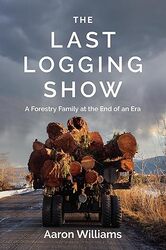
Rating: 8.0/10.
The Last Logging Show: A Forestry Family at the End of an Era by Aaron Williams
Book written by the son of a forestry family based in Haida Gwaii, BC. The author describes the logging operation that his father manages, and in different chapters of the book, he visits various workers in the operation, interviewing them on their lives and worldviews, and watching how they work. Through these interviews, we learn about the different types of machinery and techniques they use to cut down trees, load them into trucks or boats, and transport them out of the island into the wider world. A few common themes include improved productivity, where a machine operated by one person today is able to replace the jobs of several people who operated less efficient machines in previous decades; workers being older blue-collar types who have worked in forestry for many decades and are close to retirement (some who have worked with the author’s grandfather). The work is hard, physical, and often dangerous, since a piece of machinery breaking or a tree falling in an unexpected way could easily lead to injuries.
There is tension between the loggers and environmentalists, such as the Native Haida people, who are generally opposed to logging activities on the island. A large part of the book describes a blockade by environmentalist groups that prevented the loggers from continuing their operations for several weeks. During this time, they were unable to work, which caused a lot of frustration; some of these opinions were also voiced in community forums where civilians ask questions about logging practices. The book concludes that the industry is on the decline, with most of the workers near retirement or fed up with the industry and are planning to retire and move away. In the last chapter, the author and his father go on a tour of Louise Island, where his father started his career in Haida Gwaii back in 1974, and visit some of the old sites and machinery that was left behind. Now, many of the areas that have been logged before have been replenished with new trees that will soon be ready to be cut again as second-growth forests. Overall, this book provides a wide range of perspectives from different people involved with the logging industry, as well as life in this remote part of Canada’s island of Haida Gwaii.



